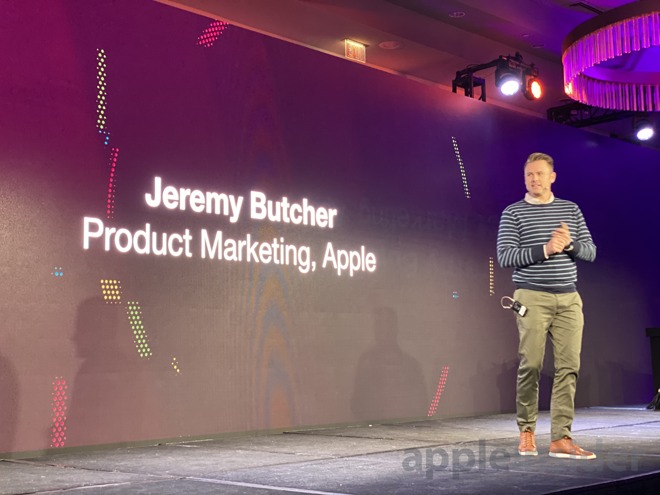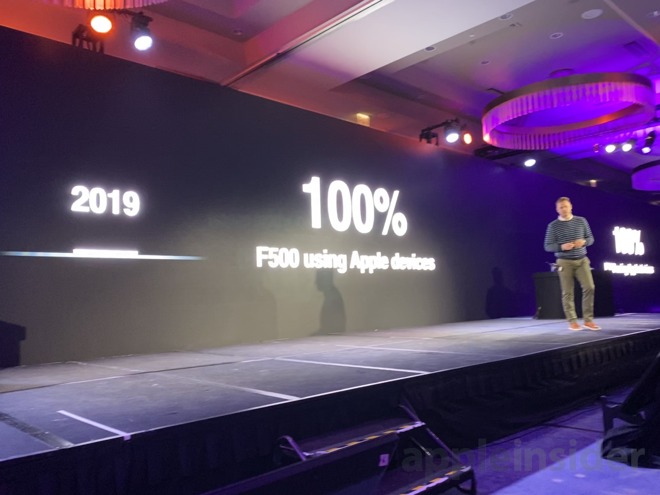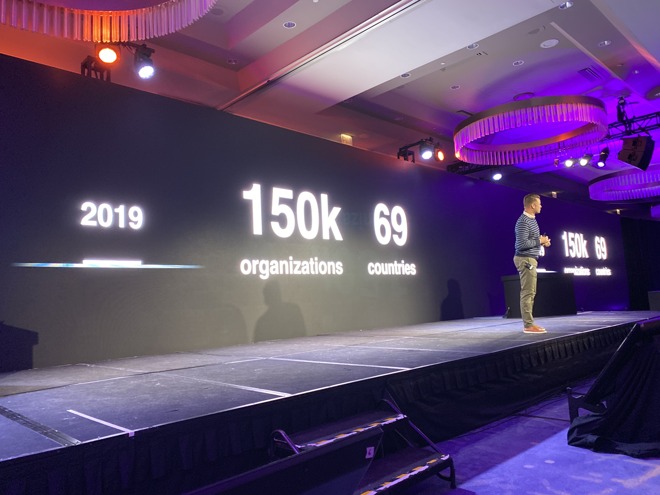100% of Fortune 500 companies are using Apple products
During the annual Jamf Nation User Conference, Apple's Jeremy Butcher took the stage to talk on Apple's commitment to education and enterprise users, boasting large gains in both programs.

Apple's Jeremy Butcher takes the stage at JNUC 2019
Butcher shared a progress report on its enterprise success, including that 100 percent of Fortune 500 companies are using Apple products. Also in 2019 are hundreds of different organizations that have over 10,000 Apple devices deployed.

100% of Fortune 500 companies use Apple
To run those organizations, Apple launched its Business Manager program in 2018 following the launch of Apple School Manager in 2016 that bring together all the different management components into a single experience.
Butcher touted that Apple now has more than 150,000 customers across 69 countries utilizing Apple's Business Manager and School Manager.

There are 150K customers across 69 countries using Apple Business Manager and Apple School Manager
Apple's success is reinforced by recent studies that show 59 percent of higher education students choose a Mac, and three out of four employees choose Apple when given a choice.
For these large organizations, Butcher says Apple focuses on four main pillars -- security, management and deployment, identity, and productivity.
"Our intent is to make products that are secure by default," says Butcher. This means making it secure out of the gate, and not something that can be disabled. For identity, Apple wants to sit at the crossroads of security for the users' personal information, while still making it easy to manage and deploy those devices. With productivity, Apple's simple goal is to make its devices "more powerful with Apple's legendary ease of use."
Butcher also spent some time talking about Apple's recent enterprise features and consumer features, such as enhancements to single sign-on, device enrollment, and iPadOS.

Apple's Jeremy Butcher takes the stage at JNUC 2019
Butcher shared a progress report on its enterprise success, including that 100 percent of Fortune 500 companies are using Apple products. Also in 2019 are hundreds of different organizations that have over 10,000 Apple devices deployed.

100% of Fortune 500 companies use Apple
To run those organizations, Apple launched its Business Manager program in 2018 following the launch of Apple School Manager in 2016 that bring together all the different management components into a single experience.
Butcher touted that Apple now has more than 150,000 customers across 69 countries utilizing Apple's Business Manager and School Manager.

There are 150K customers across 69 countries using Apple Business Manager and Apple School Manager
Apple's success is reinforced by recent studies that show 59 percent of higher education students choose a Mac, and three out of four employees choose Apple when given a choice.
For these large organizations, Butcher says Apple focuses on four main pillars -- security, management and deployment, identity, and productivity.
"Our intent is to make products that are secure by default," says Butcher. This means making it secure out of the gate, and not something that can be disabled. For identity, Apple wants to sit at the crossroads of security for the users' personal information, while still making it easy to manage and deploy those devices. With productivity, Apple's simple goal is to make its devices "more powerful with Apple's legendary ease of use."
Butcher also spent some time talking about Apple's recent enterprise features and consumer features, such as enhancements to single sign-on, device enrollment, and iPadOS.

Comments
Fabulous news ... as is AAPL ... just approaching $267!
Having said that, Amazon supports Macs 100%, no performance or access limitations. Very refreshing!
Apple's strategy lately has been to deliver 'appliance-like' devices, not user-serviceable. Even their new Mac Pro, which is positioned as being user-serviceable, still requires special "expansion modules" to be installed to get the most benefit.
Far from a Raspberry Pi that starts out as a user-serviceable board.
I don't see Apple going down this path at all. They are far too entrenched in their self-contained, consumer-focused, app-focused, service-focused path. Hardware is just the enabler. They are doing great things with hardware, but the finished product is very much an enclosed device designed to be replaced (by Apple) the following year (or six).
What I didn't say—and yet somehow you read—is a very specific number or percentage of devices being from Apple. Even if your quote from the article is specifically referring to Fortune 500 companies (which isn't not) it wouldn't say how many Fortune 500 companies those are, how many devices, what kind of devices, or deployment types for Apps devices.
Since the iOS App Store is the de facto store and even small companies have iOS apps, which means, even if they use Windows for their primary workstations, if they build that app in-house then a Mac would've been used. Is that really that hard to understand?
It's great that you read another article posted about Macs today, but what does 200K Macs mean? I simply have no idea since I don't how many Windows PC are used throughout IBM's 400k full time employees, 2 million contractors, and 500 locations in 177 countries. If you think there's a 1:1 ratio to the number of employees to the number of PCs a company has then you're sorely mistaken.
You seem to have gotten yourself all worked up because you failed to understand a story and the comments about a story that is titled with the obvious "100% of Fortune 500 companies are using Apple products." But since this is apparently news to you, I guess I'm simply not the target audience for today's self-evident news.
PS: You may want to try using paragraphs, reducing your run-on sentences, formulating your comments in a more coherent manner, and trying to respond to the same comment a single time if you don't want to come off as a spaz.
I have no idea what you mean about the Mac Pro in this context. By "special modules" you mean optional PCIe cards? What a bizarre counter-example to the Raspberry Pi.
"far too entrenched" ... okay.
Except you're completely wrong. They support the current OS plus the previous two major versions with security updates pretty consistently, so about three years back with OS updates. Occasionally further back with some software things depending on necessity. Hardware they support for about 7 years before it becomes "obsolete" with regard to repairs. Current versions of macOS can usually be installed about as far back as 6-7 year old hardware at least if not older in some cases.